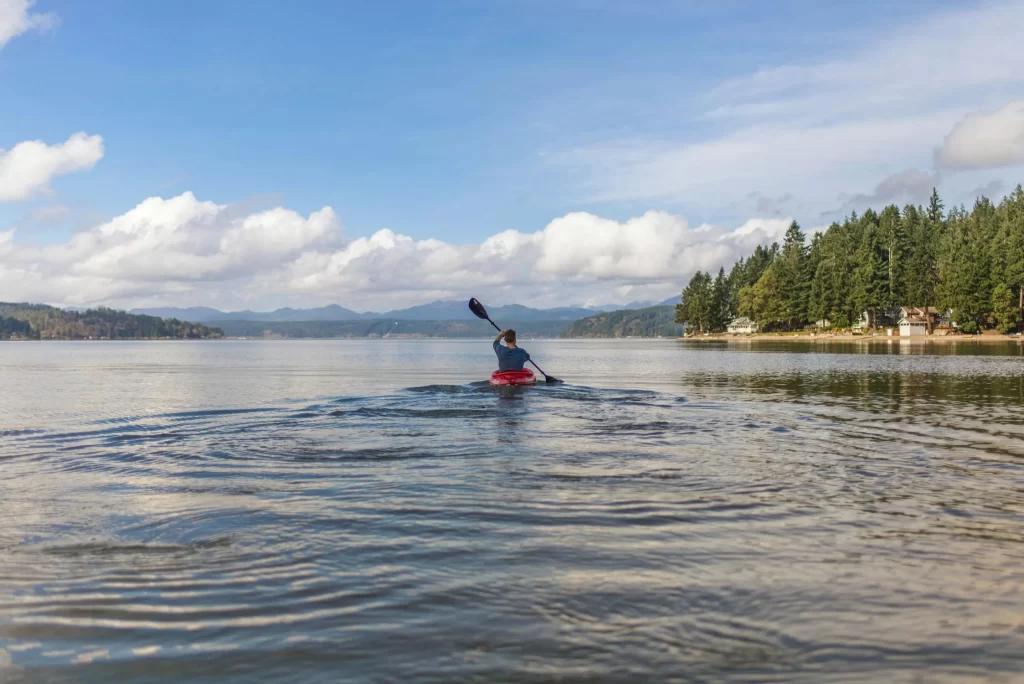By Katie Potocnik Medina, LCSW | Senior Psychotherapist
As a nature lover, I often find myself rejuvenated after spending time outdoors. The healing and spiritual benefits of being in nature are profound, allowing me to be in the moment and feel deeply connected to the world around me. This personal experience is not just anecdotal; research increasingly supports the idea that nature can play a crucial role in mental health and trauma recovery.
The Impact of Trauma and the Role of Nature Therapy
Trauma, especially in children, can have lasting effects on mental health and overall well-being. Traditional therapies, while effective, sometimes fail to engage the full spectrum of sensory and emotional experiences that are crucial for holistic healing. This is where nature therapy, particularly trauma-informed nature therapy, comes into play.
Trauma-informed nature therapy leverages the healing elements of the natural world, providing both restorative and preventative benefits for those experiencing adversity. Unlike traditional talk therapies, nature therapy involves the body and senses in a way that promotes comprehensive healing. It typically takes place outdoors and is led by a licensed mental health professional who views nature as a co-therapist.

Multisensory Healing and Whole-Body Engagement
Nature therapy engages the whole brain and body, facilitating a range of experiences that can foster unique coping skills, including empowerment, strength, and confidence. Research shows that this form of therapy can calm the limbic system, enhance the prefrontal cortex, expand support networks, provide opportunities for physical mastery, and aid in reconstructing trauma narratives.
One compelling case study highlights the transformative power of nature therapy. A young girl named Anna, who experienced severe trauma after being raped at 15, found herself isolated and detached from her surroundings, including the animals she once loved. Her journey of healing began when her therapist included nature-related activities in her sessions. Interactions with animals, walks by the river, and kayaking helped Anna reconnect with her own embodied power and eventually prepared her to confront and process her trauma.
Nature as a Co-Therapist
Engaging with nature allows clients to experience a wide range of whole-brain, whole-body experiences. These experiences are not only healing but also help in developing new coping strategies. For children, this can mean improved resilience and a stronger ability to recover from trauma.
Nature therapy is particularly effective because it incorporates elements that are often missing in traditional therapy. For instance, the multisensory involvement and the active, physical engagement with nature can provide a sense of mastery and control that is often lost in the wake of trauma. This approach can also be safer and more effective for children, as it moves beyond the confines of verbal communication and engages them in a more holistic healing process.
Personal Reflections and the Broader Implications
From my own experiences, I can attest to the immediate benefits of being in nature. The serenity and connection I feel in natural settings are profound and deeply healing. This personal connection aligns with the growing body of research supporting nature therapy as a valuable tool in trauma recovery.
Incorporating nature into therapeutic practices offers a powerful avenue for healing, one that recognizes the importance of the natural world in our mental and emotional well-being. As we continue to explore and understand the benefits of nature therapy, it becomes clear that the more-than-human world can play a pivotal role in helping individuals, especially children, overcome the impacts of trauma.

Accessing Nature for Healing
For those who may not participate in formal nature therapy, there are numerous ways to access nature’s healing benefits. Here are some suggestions:
- Daily Walks: Incorporating daily walks in a park or natural setting can provide a sense of calm and relaxation. The act of walking itself, combined with the presence of trees, water, and wildlife, can reduce stress and improve mood.
- Gardening: Engaging in gardening, whether in a backyard or a community garden, allows individuals to connect with the earth, cultivate life, and find a sense of purpose and accomplishment.
- Mindful Observation: Spending time observing nature, whether it’s watching birds, listening to the sounds of a forest, or simply sitting by a body of water, can enhance mindfulness and provide a break from the constant stimuli of daily life.
- Outdoor Activities: Activities such as hiking, kayaking, or biking not only provide physical exercise but also immerse individuals in natural environments that promote overall well-being.
- Nature Retreats: Participating in nature retreats or camping trips can offer immersive experiences that disconnect from daily stresses and reconnect with the simplicity and beauty of the natural world.
- Bringing Nature Indoors: For those who may not have easy access to outdoor spaces, bringing nature indoors through houseplants, nature sounds, and natural light can also offer psychological benefits.
By incorporating these practices into daily life, individuals can tap into the restorative power of nature, fostering resilience and aiding in the healing process from trauma. Whether through structured therapy or personal engagement with the natural world, the benefits of nature are accessible to all and can play a vital role in mental health and recovery.
Citations
- North American Association for Environmental Education. (2020). Nature therapy can promote resiliency and trauma recovery in children. Retrieved from https://eepro.naaee.org/research/eeresearch/nature-therapy-can-promote-resiliency-and-trauma-recovery-children
- Dutfield, C. (2021). How nature can help heal from trauma. Psychreg. Retrieved from https://www.psychreg.org/how-nature-can-help-heal-from-trauma/




